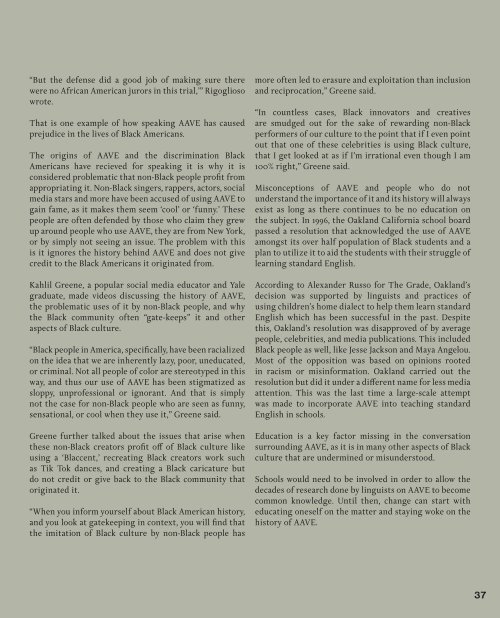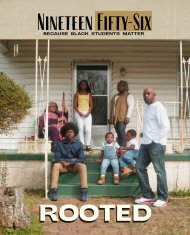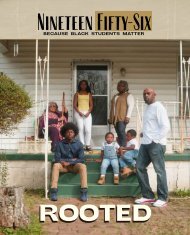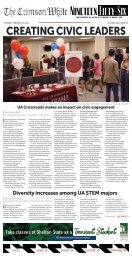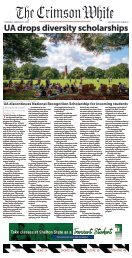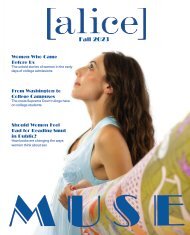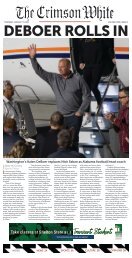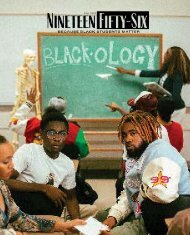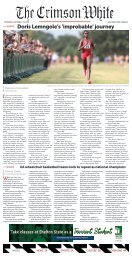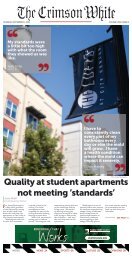Nineteen Fifty-Six Vol. 2 No. 5
This is the 2022 print edition of Nineteen Fifty-Six magazine. The theme "Movin' On Up" is inspired by the Black Panther Party.
This is the 2022 print edition of Nineteen Fifty-Six magazine. The theme "Movin' On Up" is inspired by the Black Panther Party.
You also want an ePaper? Increase the reach of your titles
YUMPU automatically turns print PDFs into web optimized ePapers that Google loves.
“But the defense did a good job of making sure there<br />
were no African American jurors in this trial,’” Rigoglioso<br />
wrote.<br />
That is one example of how speaking AAVE has caused<br />
prejudice in the lives of Black Americans.<br />
The origins of AAVE and the discrimination Black<br />
Americans have recieved for speaking it is why it is<br />
considered problematic that non-Black people profit from<br />
appropriating it. <strong>No</strong>n-Black singers, rappers, actors, social<br />
media stars and more have been accused of using AAVE to<br />
gain fame, as it makes them seem ‘cool’ or ‘funny.’ These<br />
people are often defended by those who claim they grew<br />
up around people who use AAVE, they are from New York,<br />
or by simply not seeing an issue. The problem with this<br />
is it ignores the history behind AAVE and does not give<br />
credit to the Black Americans it originated from.<br />
Kahlil Greene, a popular social media educator and Yale<br />
graduate, made videos discussing the history of AAVE,<br />
the problematic uses of it by non-Black people, and why<br />
the Black community often “gate-keeps” it and other<br />
aspects of Black culture.<br />
“Black people in America, specifically, have been racialized<br />
on the idea that we are inherently lazy, poor, uneducated,<br />
or criminal. <strong>No</strong>t all people of color are stereotyped in this<br />
way, and thus our use of AAVE has been stigmatized as<br />
sloppy, unprofessional or ignorant. And that is simply<br />
not the case for non-Black people who are seen as funny,<br />
sensational, or cool when they use it,” Greene said.<br />
Greene further talked about the issues that arise when<br />
these non-Black creators profit off of Black culture like<br />
using a ‘Blaccent,’ recreating Black creators work such<br />
as Tik Tok dances, and creating a Black caricature but<br />
do not credit or give back to the Black community that<br />
originated it.<br />
“When you inform yourself about Black American history,<br />
and you look at gatekeeping in context, you will find that<br />
the imitation of Black culture by non-Black people has<br />
more often led to erasure and exploitation than inclusion<br />
and reciprocation,” Greene said.<br />
“In countless cases, Black innovators and creatives<br />
are smudged out for the sake of rewarding non-Black<br />
performers of our culture to the point that if I even point<br />
out that one of these celebrities is using Black culture,<br />
that I get looked at as if I’m irrational even though I am<br />
100% right,” Greene said.<br />
Misconceptions of AAVE and people who do not<br />
understand the importance of it and its history will always<br />
exist as long as there continues to be no education on<br />
the subject. In 1996, the Oakland California school board<br />
passed a resolution that acknowledged the use of AAVE<br />
amongst its over half population of Black students and a<br />
plan to utilize it to aid the students with their struggle of<br />
learning standard English.<br />
According to Alexander Russo for The Grade, Oakland’s<br />
decision was supported by linguists and practices of<br />
using children’s home dialect to help them learn standard<br />
English which has been successful in the past. Despite<br />
this, Oakland’s resolution was disapproved of by average<br />
people, celebrities, and media publications. This included<br />
Black people as well, like Jesse Jackson and Maya Angelou.<br />
Most of the opposition was based on opinions rooted<br />
in racism or misinformation. Oakland carried out the<br />
resolution but did it under a different name for less media<br />
attention. This was the last time a large-scale attempt<br />
was made to incorporate AAVE into teaching standard<br />
English in schools.<br />
Education is a key factor missing in the conversation<br />
surrounding AAVE, as it is in many other aspects of Black<br />
culture that are undermined or misunderstood.<br />
Schools would need to be involved in order to allow the<br />
decades of research done by linguists on AAVE to become<br />
common knowledge. Until then, change can start with<br />
educating oneself on the matter and staying woke on the<br />
history of AAVE.<br />
37


